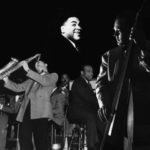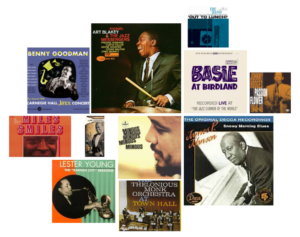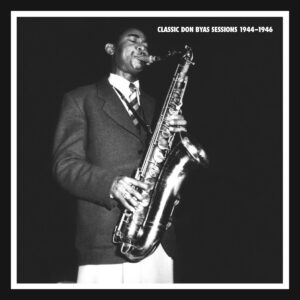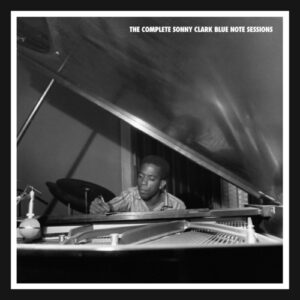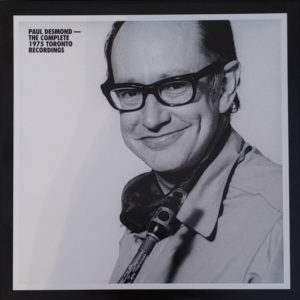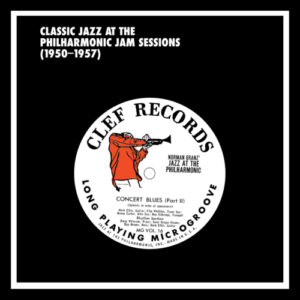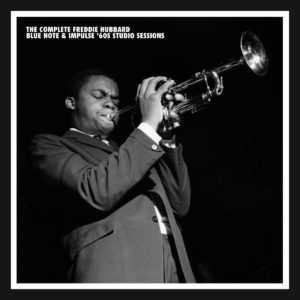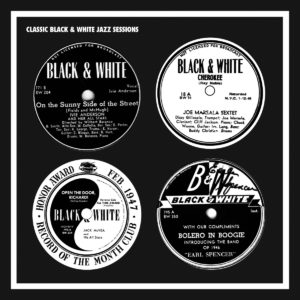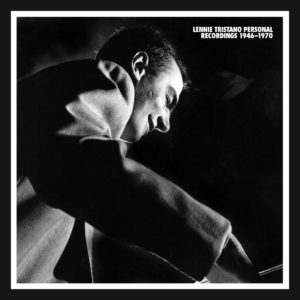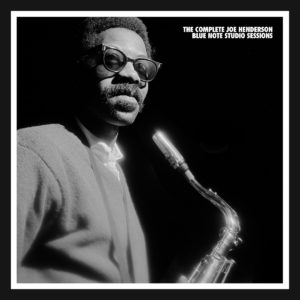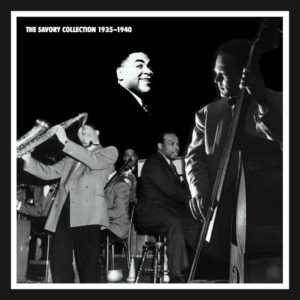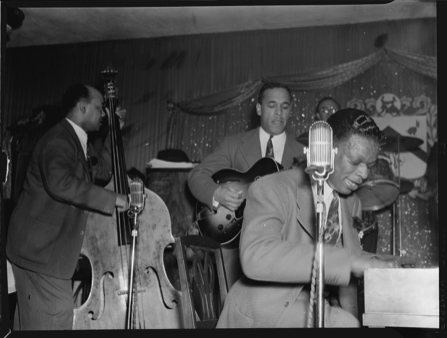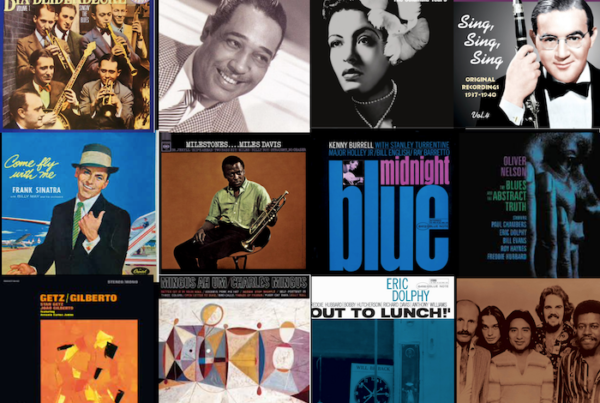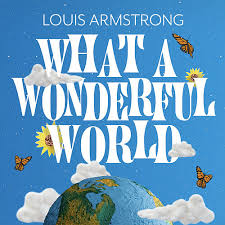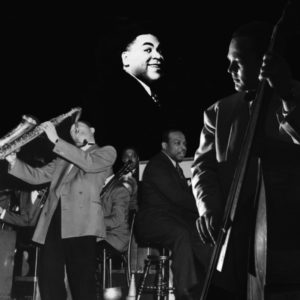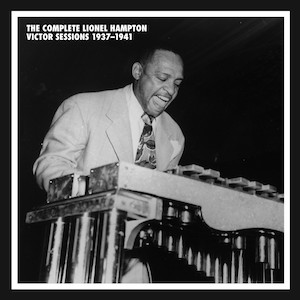
The Complete Lionel Hampton Victor Sessions 1937-1941
(Set is out-of-print)
By Alan Goodman
Would we know how jazz is played on the vibes without Lionel Hampton? He introduced the concept of personality to an instrument thought to be sterile and cold; showed how to solo with authority and accompany with grace; taught how to make the instrument express emotions as divergent as tender melancholy and unrestrained joy and did it all with the recordings now available from Mosaic.
We regard this set as among our very significant releases, because of the moment in music it captures; because of the quality of the music and the sidemen; because of the comprehensive nature of the collection; and because of the sound quality, improved over all other releases thanks to our luck in tracking down every original Victor metal part and test pressing.
The big change in Lionel Hampton‘s career came when Benny Goodman traveled to Los Angeles in 1936. When Goodman heard Hampton, his trio became a quartet. After he left Goodman in 1940, Hampton formed a big band. But during 1937 to 1941, while he was still recording with Goodman, Hampton began making these small group recordings.
Quickly he found himself at the center of the swing world, and able to attract the most sought-after musical names and voices. On one session, he led the all-star reed section of Benny Carter, Coleman Hawkins, Chu Berry, and Ben Webster, along with Dizzy Gillespie, Clyde Hart, Charlie Christian, Milt Hinton, and Cozy Cole. How’s that for a line-up?
Another set included Henry “Red” Allen, J.C. Higginbottham, Earl Bostic, Clyde Hart, Charlie Christian, Artie Bernstein and Sid Catlett. Then there was Buster Bailey, Johnny Hodges, Jess Stacy, Allen Reuss, John Kirby and Cozy Cole. The groupings are truly inspired.
Along with the Goodman sidemen sessions and the Ellington sidemen sessions, Hampton recorded with the early Nat “King” Cole Trio, the unmistakable Harry James, plus Russell Procope, Rex Stewart, Harry Carney, Sonny Greer, Freddie Green, Sir Charlies Thompson – the list goes on and on. This collection includes all of Hampton’s known recordings for Victor; 108 in all. Our lavish booklet includes never before published photographs; liner notes by Grammy winner Loren Schoenberg; and the first complete discography of the dates, culled from the Victor file cards and session sheets and cross-referenced against a number of authoritative sources.
The Complete Lionel Hampton Victor Sessions 1937-1941
December 21st, 1939
Benny Carter (tp), Edmond Hall (cl), Coleman Hawkins (ts), Lionel Hampton (vib), Joe Sullivan (p), Freddie Green (g), Artie Bernstein (b), Zutty Singleton (d)
Track analysis by Loren Schoenberg
This is one of the highlights of the entire series. For starters, Coleman Hawkins is not only in superb form, but his rich tone was captured in all its complexity by the Victor engineers.
Then there is the rhythm section which, it’s fair to guess, had never played together before but which immediately coalesced into a unit as precise and swinging as the April ’39 Hart/Reuss/Hinton/Cole combination. Pianist Joe Sullivan was firmly ensconced in the so-called “Chicago” school of jazz, which in reality was just young White musicians making their own variations on Oliver, Armstrong and Beiderbecke, but which was receiving quite bit of press in those days.
Sullivan may have been influenced by Earl Hines (as was Teddy Wilson, Art Tatum, Jess Stacy, Nat Cole, just to name a few) but he, like they, found a way to use it as an inspiration for his own creativity, One of the joys of listening to Sullivan at his best is hearing him walk the high-wire he strings for himself.
Freddie Green was a member of jazz’s outstanding rhythm section of the time (Basie’s) and a superlative ensemble musician. Bassist Bernstein, as previously noted, had a big tone and solid intonation. If his lines weren’t as melodic as Milt Hinton’s or Israel Crosby’s, he was certainly an asset to any band for the sheer oomph he generated.
Zutty Singleton was no less than one of the progenitors of jazz drumming. In the 1920s, he was Louis Armstrong’s drummer of choice, and it’s one of the shames of early jazz that the relatively basic recording techniques of the day were unable to fully capture what both he and Baby Dodds did every night on the gig. Many early “trad” drummers tried to copy what they played on those 1920s recordings, without realizing that what they were hearing was just a shadow of what Dodds, Singleton and their peers actually sounded like.
Benny Carter played the trumpet with the same ease, if not the same technique, with which he played the saxophone. New Orleans was the home of both Zutty Singleton and clarinetist Edmond Hall, who gets the short end of the (licorice) stick, being granted only one duet passage and no solos. A few years later he came into his own as a respected stylist. Just a week earlier, Carter, Hawkins, Sullivan and Bernstein had recorded an all-star session as The Varsity Seven (for Eli Oberstein’s Varsity label), which also may account for the high level of cohesion.
The session starts out with some real dynamite. Dinah is kicked off by a Hampton introduction that quotes Buddy Bolden’s Blues (possibly in honor of his Crescent City guests).
After making a brief nod towards the melody, Carter launches into his opening solo chorus. A key ingredient in playing jazz is listening. In the same way that a good conversationalist knows how to stop and let others speak and then react to what has been said, jazz musicians have the ability to carry on conversations with others. Carter shows this ability when he gets to bridge.
Sullivan begins to outline the harmony with a descending line which is no sooner stated then embraced by Carter and woven into his solo. Hawkins was also listening to this, as we’ll see. Everything is made to sound fresh and new by the clearly defined beat that the rhythm section is producing. They achieve a synergy, each hitting the same quarter note at precisely the same split-second. Moreover, they do it so sparely that it gives any one of them the opportunity to make a comment that has no chance of being lost in the shuffle.
Contrast that with many post-1940s rhythm sections which have so much going on at the same time that nothing can be heard and/or prioritized. Hear how this unit, because of the open space they leave, gives the soloist a wide berth to create rhythmic, harmonic and/or melodic dissonances that mean all that much more because of the open horizon behind them.
Just a moment before Hawkins enters, Sullivan hits a short but pointed tritone in the lower register that sets the tenorist off into a dissonant phrase. If these men were sharpshooters, they could have ruled the wild Wild West, so quick are their responses. A life-long devotee of Bach’s music, Hawkins uses the piano’s descending notes on the bridge to create his own chromatic fantasy – this is truly one of his greatest solos on disc.
Sullivan was not deaf to recent developments in jazz piano, and the backing he uses for Hampton here (and also played behind Lester Young just a week earlier on a Billie Holiday recording session) reflects an awareness of the possibilities of pianistic pointillism as popularized by Count Basie. Lionel Hampton concludes with two choruses, of which the bridges are among his most inspired creations.
The rhythm section really kicks in without the slightest feeling of strain or tension. Singleton spanks every other fourth beat lightly, and listen for Bernstein’s skipped note (this was a trademark of Walter Page, Basie’s bassist and Green’s mentor) and Green’s immediate response at the end of the last bridge.
Discography
All sessions as “Lionel Hampton and Orchestra” or “Lionel Hampton and his Orchestra” unless noted. To the best of our knowledge, the discography is in the order in which the tunes were recorded. However, the CDs contained in this box set are presented with the master take first and then any alternates at the conclusion of the disc.
________________________________________________________________________
(A) Ziggy Elman (tp), Hymie Schertzer, George Koenig (as), Vido Musso, Arthur Rollini (ts), Lionel Hampton (vib, vcl), Jess Stacy (p), Allen Reuss (g), Harry Goodman (b), Gene Krupa (d).
Supervised by Leonard Joy
NYC, February 8, 1937
04582-2 My Last Affair (LH-vcl) RCA (F) NL 89583 (LP)
04582-1 My Last Affair (LH-vcl) Vic 25527
04583-1 Jivin’ The Vibres Vic 25535
04584-1The Mood That I’m In (LH-vcl) Vic 25527
04585-1 Stomp –1 Vic 25535
–1 Hampton (d) replaces Krupa.
Note: The master and alternate of matrix 04582 are reversed on the RCA LP and CD 66500, The Complete Lionel Hampton vol. 1/2 (1937-1938).
________________________________________________________________________
(B) Cootie Williams (tp), Lawrence Brown (tb), Johnny Hodges (as), Lionel Hampton (vib, vcl), Jess Stacy (p), Allen Reuss (g), John Kirby (b), Cozy Cole (d).
Supervised by Eli Oberstein & Leonard Joy
NYC, April 14, 1937
07792-3R Buzzin’ ‘Round With The Bee (LH-sp) Vic 25575
07793-3R Whoa Babe (LH-vcl) –
07794-1 Stompology Vic 25601
Note: The flip side of Victor 25601 is by the Quintette of the Hot Club of France.
Mezz Mezzrow’s name was listed on the label and in discographies, but he is not audible. ________________________________________________________________________
(C) Buster Bailey (cl), Johnny Hodges (sop, as), Lionel Hampton (vib, vcl), Jess Stacy (p), Allen Reuss (g), John Kirby (b), Cozy Cole (d).
Supervised by Leonard Joy
NYC, April 26, 1937
07864-1 On The Sunny Side Of The Street (LH-vcl) Vic 25592
07865-1 Rhythm, Rhythm (I Got Rhythm) Vic 25586
07866-1 China Stomp (Chinatown, My Chinatown) –1 –
07867-1A I Know That You Know –2 Vic 25592
–1 Hampton and Stacy (p); omit Hodges.
–2 Hampton (d) replaces Cole.
________________________________________________________________________
(D) Jonah Jones (tp), Eddie Barefield (cl), Lionel Hampton (vib, vcl), Clyde Hart (p), Bobby Bennett (g), Mack Walker (b), Cozy Cole (d).
NYC, August 16, 1937
09644-1 Confessin’ (That I Love You) (LH-vcl) Vic 25658
09645-1 Drum Stomp (Crazy Rhythm) –1 –
09646-1 Piano Stomp (Shine) –2 Vic 25666
09647-1 I Surrender Dear –
–1 Hampton (d) replaces Cole.
–2 Add Hampton (p).
________________________________________________________________________
(E) Ziggy Elman (tp), Vido Musso (cl, ts), Arthur Rollini (ts), Lionel Hampton (vib, vcl), Jess Stacy (p), Allen Reuss (g), Johnny Miller (b), Cozy Cole (d).
NYC, September 5, 1937
09680-1 The Object Of My Affections (LH-vcl) RCA (F) 741077 (LP)
09680-2 The Object Of My Affections (LH-vcl) Vic 25699
09681-2 Judy (LH-vcl) –
09682-2 Baby, Won’t You
Please Come Home (LH-vcl) Vic 25674
09683-2 Everybody Loves My Baby (LH-vcl) Vic 25682
09684-1 After You’ve Gone (LH-vcl) Vic 25674
09685-1 I Just Couldn’t Take It, Baby (LH-vcl) Vic 25682
________________________________________________________________________
(F) Cootie Williams (tp), Johnny Hodges (as), Edgar Sampson (bari, arr), Lionel Hampton (vib, vcl), Jess Stacy (p), Allen Reuss (g), Billy Taylor (b), Sonny Greer (d).
Supervised by Leonard Joy
NYC, January 18, 1938
018335-1 You’re My Ideal (LH-vcl) Vic 25771
018336-1 The Sun Will Shine Tonight (LH-vcl) previously unissued
018336-2 The Sun Will Shine Tonight (LH-vcl) Vic 25771
018337-1 Ring Dem Bells (LH-vcl) Vic 25889, 26017
018338-1 Don’t Be That Way (ES-arr) Vic 26173
Note: Although some discographies list Victor 25889 as never being issued, matrix 018337 did appear and was backed with Pick The Winner a horse racing game! The more common release, Victor 26017, was issued shortly thereafter and is listed here as well.
As is noted in the liner notes to this set, Edgar Sampson is more than likely the arranger on all of the titles from this session.
________________________________________________________________________
(G) Harry James (tp), Benny Carter (cl, as, arr), Dave Matthews (as), Babe Russin, Herschel Evans (ts), Lionel Hampton (vib, vcl), Billy Kyle (p), John Kirby (b), Jo Jones (d).
NYC, July 21, 1938
024065-1 I’m In The Mood For Swing (BC-arr) Vic 26011
024066-1 Shoe Shiner’s Drag –
024067-1 Any Time At All (LH-vcl) (BC-arr) Vic 26039
024068-1 Muskrat Ramble Vic 26017
Note: The flip side of Victor 26039 is by Nick LaRocca and the Original Dixieland Band.
________________________________________________________________________
(H) Walter Fuller (tp), Omer Simeon (cl, as), George Oldham (as), Budd Johnson (cl, ts, prob. arr. on all titles), Robert Crowder (ts), Lionel Hampton (vib, vcl), Spencer Odom (p), Jesse Simpkins (b), Alvin Burroughs (d).
NYC, October 11, 1938
025866-1 Down Home Jump Vic 26114
025867-1 Rock Hill Special –1 –
025868-1 Fiddle Diddle (LH-vcl) Vic 26173
–1 Add Hampton (p and vib).
________________________________________________________________________
(I) Irving Randolph (tp), Hymie Schertzer, Russell Procope (cl, as), Jerry Jerome (cl, b-cl, ts), Chu Berry (cl, ts), Lionel Hampton (vib, vcl), Clyde Hart (p), Allan Reuss (g), Milt Hinton (b), Cozy Cole (d), Fred Norman (arr).
Supervised by Leonard Joy
NYC, April 3, 1939
035392-1 I Can Give You Love (LH-vcl) Vic 26343
035393-1 High Society (FN-arr) Vic 26209
035394-2 It Don’t Mean A Thing (If It Ain’t Got That Swing) (LH-vcl) previously unissued
035394-1 It Don’t Mean A Thing (If It Ain’t Got That Swing) (LH-vcl) Vic 26254
035395-1 Johnny Get Your Horn (LH-vcl) Vic 26343
Note: Discographies list Hymie Schertzer as the bass clarinetist on High Society. However, Jerry Jerome confirmed he was the soloist.
The ledgers reveal that a rehearsal was called after this session from 1:30-2:30pm and included those who would participate in the April 5th session. No recordings were made.
________________________________________________________________________
(J) Chu Berry (ts), Lionel Hampton (vib, vcl), Clyde Hart (p), Allan Reuss (g), Milt Hinton (b), Cozy Cole (d).
NYC, April 5, 1939
035703-1 Sweethearts On Parade (LH-vcl) Vic 26209
035704-1 Shufflin’ At The Hollywood RCA (G) LPM 10024 (LP)
035704-2 Shufflin’ At The Hollywood Vic 26254
035705-1 Denison Swing –1 Vic 26233
035706-1 Wizzin’ The Wizz –2 Mosaic MD7-236 (CD)
035706-2 Wizzin’ The Wizz –2 Vic 26233
–1 Hampton (p) replaces Hart.
–2 Hampton and Hart (p).
________________________________________________________________________
(K) Ziggy Elman (tp), Hymie Schertzer (cl, as), Russell Procope (cl, sop, as), Jerry Jerome, Chu Berry (cl, ts), Lionel Hampton (vib, d, timpany, vcl, arr), Clyde Hart (p), Danny Barker (g), Milt Hinton (b), Cozy Cole (d), Fred Norman (arr).
Supervised by Steve Sholes
NYC, June 9, 1939
037614-1 If It’s Good (LH-vcl) (LH, FN-arr) Vic LPM 6702-5 (LP)
037615-1 Stand By! For Further Announcements (And More Good News) (LH-vcl) (LH, FN-arr) Vic 26296
037616-1 Ain’t Cha Comin’ Home ? Vic 26362
037617-2 Big Wig In The Wigwam (ens.vcl) (LH, FN-arr) previously unissued 037617-1 Big Wig In The Wigwam (ens.vcl) (LH, FN-arr) Vic 26296
________________________________________________________________________
(L) Rex Stewart (cor), Lawrence Brown (tb), Harry Carney (bari), Lionel Hampton (vib, vcl), Clyde Hart (p), Billy Taylor (b), Sonny Greer (d), Fred Norman (arr).
NYC, June 13, 1939
037630-1 Memories Of You (FN-arr) Vic 26304
037631-1 The Jumpin’ Jive (LH-vcl) (FN-arr) –
037632-2 Twelfth Street Rag –1 previously unissued
037632-1 Twelfth Street Rag –1 Vic 26362
–1 Add Hampton (p).
________________________________________________________________________
(M) Dizzy Gillespie (tp), Benny Carter (as, arr), Coleman Hawkins, Chu Berry, Ben Webster (ts), Lionel Hampton (vib), Clyde Hart (p), Charlie Christian (g), Milt Hinton (b), Cozy Cole (d).
Supervised by Leonard Joy
NYC, September 11, 1939
041406-2 When Lights Are Low RCA (F) PM 42406 (LP)
041406-1 When Lights Are Low Vic 26371
041407-1 One Sweet Letter From You (LH-vcl)Vic 26393
041408-1 Hot Mallets Vic 26371
041409-1 Early Session Hop Vic 26393
________________________________________________________________________
(N) Henry “Red” Allen (tp, vcl), J.C. Higginbotham (tb), Earl Bostic (as), Lionel Hampton (vib, vcl), Clyde Hart (p), Charlie Christian (g, el-g), Artie Bernstein (b), Sid Catlett (d).
NYC, October 12, 1939
042941-1 I’m On My Way From You (LH-vcl) Vic 26476
042942-1 Haven’t Named It Yet –
042943-1 The Heebie Jeebies Are Rockin’ The Town (LH, HA-vcl) Vic 26423
042943-2 The Heebie Jeebies Are Rockin’ The Town (LH, HA-vcl) –
Note: Matrix 042943-1 was not released until c. 1945. The title given in the ledgers and file cards is The Heebie Jeebies Rock.
________________________________________________________________________
(O) Ziggy Elman (tp), Toots Mondello (cl, as), Jerry Jerome (ts), Ben Webster (ts), Lionel Hampton (vib, vcl), Clyde Hart (p, arr), Al Casey (g), Artie Bernstein (b), Slick Jones (d).
Supervised by Leonard Joy
NYC, October 30, 1939
043246-1 The Munson Street Breakdown (CH-arr) –1 Vic 26453
043247-1 I’ve Found A New Baby (CH-arr) –2 Vic 26447
043248-1 I Can’t Get Started (CH-arr) Vic 26453
043249-1 Four Or Five Times (LH-vcl) (CH-arr) Vic 26447
043250-1 Gin For Christmas –3 Vic 26423
–1 Add Hampton (p and vib).
–2 Add Hampton (p).
–3 Hampton (d) replaces Jones.
Note: The ledgers and file cards indicate that Fletcher Henderson was the arranger on I’ve Found A New Baby.
________________________________________________________________________
(P) Benny Carter (tp), Edmond Hall (cl), Coleman Hawkins (ts), Lionel Hampton (vib), Joe Sullivan (p), Freddie Green (g), Artie Bernstein (b), Zutty Singleton (d).
Supervised by Leonard Joy
NYC, December 21, 1939
046024-2 Dinah RCA Victor LPV 501 (LP)
046024-1 DinahVic 26557
046025-1 My Buddy Vic 26608
046026-1 Singin’ The Blues Vic 26557
________________________________________________________________________
(Q) Ziggy Elman (tp), Toots Mondello, Buff Estes (as), Jerry Jerome, Budd Johnson (ts), Lionel Hampton (vib), Spencer Odom (p), Ernest Ashley (g), Artie Bernstein (b), Nick Fatool (d).
Chicago, February 26, 1940
044724-1 Shades Of Jade Vic 22604
044725-1 Till Tom Special –
044726-1 Flyin’ Home Vic 26595
044727-1 Save It, Pretty Mama –
044728-1 Tempo And Swing Vic 26608
________________________________________________________________________
(R) Lionel Hampton (vib), Nat “King” Cole (p), Oscar Moore (el-g), Wesley Prince (b), Al Spieldock (d), Helen Forrest (vcl).
Supervised by Harry Meyerson
Hollywood, May 10, 1940
049674-1 House Of Morgan Vic 26751
049675-1 I’d Be Lost Without You (HF-vcl) –
049676-1 Central Avenue Breakdown –2 Vic 26652
049677-1 Jack The Bellboy –1 –
–1 Hampton (d) replaces Spieldock.
–2 Hampton and Cole (p).
Note: What should be Jack The Bellboy on Bluebird CD 63966, (Ring Dem Bells), is actually House Of Morgan.
________________________________________________________________________
(S) Lionel Hampton (vib, vcl), Nat “King” Cole (p, vcl), Oscar Moore (el-g, vcl), Wesley Prince (b), Al Spieldock (d), Hampton Rhythm Boys (Cole, Moore), Helen Forrest (vcl).
prob. supervised by Harry Meyerson
Hollywood, July 17, 1940
049932-2 Dough-Ra-Me (HRB-vcl) RCA (J) 90-95 (LP)
049932-1 Dough-Ra-Me (HRB-vcl) Vic 26696
049933-1 Jivin’ With Jarvis (LH, NKC, OM-vcl) Vic 26724
049934-1 Blue –
049935-1 I Don’t Stand A Ghost Of A Chance With You (HF-vcl) Vic 26696
________________________________________________________________________
(T) Lionel Hampton (vib), Marlowe Morris (p), Teddy Bunn (el-g), Douglas Daniels (tipple, vcl), Hayes Alvis (b), Kaiser Marshall (d).
NYC, August 21, 1940
055532-2 Just For Laffs previously unissued
055532-1 Just For Laffs Vic 26793
055533-1 Martin On Every Block previously unissued
055533-2 Martin On Every Block Vic 26739
055534-1 Pig Foot Sonata Vic 26793
055535-1 Charlie Was A Sailor (DD-vcl) Vic 26739
Note: Matrix 055533-1 is listed in discographies as being issued on Victor 26739. However, the file cards and ledgers list only -2 as being scheduled for release and copies of Victor 26739 we have examined contain only -2 as the master. One of the many reissues claiming they used -1 but actually used -2, is the LP box set The Complete Lionel Hampton / 1937-1941 (Bluebird AXM6-5536).
________________________________________________________________________
(U) LIONEL HAMPTON & HIS SEXTETTE: Lionel Hampton (vib), Sir Charles Thompson (p), Irving Ashby (g), Vernon Alley (b), Lee Young (d, vcl), Hampton Rhythm Girls (Evelyn Myers and 2 unknown) (vcl).
Supervised by Harry Meyerson
Hollywood, December 19,1940
055228-2 Lost Love (LY, HRG-vcl) Vic 27278
Marshal Royal (cl), Lionel Hampton (vib), Sir Charles Thompson (p), Irving Ashby (g), Vernon Alley (b), Lee Young (d), Evelyn Myers (vcl).
same session
055229-1 I Nearly Lost My Mind (EM-vcl) Vic 27316
Marshal Royal (cl), Lionel Hampton (vib), Sir Charles Thompson (p), Ray Perry (el-vln), Irving Ashby (el-g), Vernon Alley (b), Lee Young (d).
same session
055230-1 Altitude Vic 27316
055231-1 Fiddle-Dee-Dee Vic 27364
Note: Matrix 055228-1 is listed in discographies as being issued on Victor 27278, however, this take has eluded us and therefore we cannot confirm its existance. In addition, the metal part (and any test pressings) are no longer in the physical posession of BMG. The CD release on Classics 624 (Lionel Hampton 1941) and RCA (J) 90-95 (LP) both list Lost Love as using -1, however, -2 is the take that is used.
________________________________________________________________________
(V) LIONEL HAMPTON AND HIS SEXTETTE: Marshal Royal (cl, as), Lionel Hampton (vib, vcl), Sir Charles Thompson (p), Ray Perry (el-vln), Irving Ashby (el-g), Vernon Alley (b), Lee Young (d), Hampton Rhythm Girls (Evelyn Myers and 2 unknown) (vcl).
Supervised by Harry Meyerson
Hollywood, December 20, 1940
055234-1 Bogo-Jo (LH, HRG-vcl) Vic 27341
055235-1 Open House –
055236-1 Smart Aleck Vic 27278
055237-1 Bouncing At The Beacon –1 Vic 27364
–1 Hampton and Thompson (p).
________________________________________________________________________
(W) LIONEL HAMPTON AND HIS SEXTET: Karl George (tp), Marshal Royal (cl, vcl), Lionel Hampton (vib, vcl), Sir Charles Thompson (p), Ray Perry (el-vln, as), Irving Ashby (el-g), Vernon Alley (b), Shadow Wilson (d), Ruble Blakey (vcl).
Chicago, April 8, 1941
064055-2R Give Me Some Skin (LH, RB, MR-vcl) Vic 27409
064056-1 Now That You’re Mine (RB-vcl) Vic 27529
064057-2 Chasin’ With Chase –1 previously unissued
064057-1 Chasin’ With Chase –1 Vic 27529
064058-2 Three Quarter Boogie previously unissued
064058-1 Three Quarter Boogie Vic 27409
–1 Hampton (d) replaces Wilson.
Note: Metal parts of matrix 064055 exist with -1 and -3R, however, they are dubs of -2R.
________________________________________________________________________
The original recording supervisors for these sessions were Leonard Joy, Eli Oberstein, Steve Sholes and Harry Meyerson.
Produced for release by Scott Wenzel
Executive Producer: Michael Cuscuna
Disc transfers: Mark Wilder and Andreas Meyer
Mastered using 24-bit technology by Malcolm Addey
Vault research: Anthony Fountain, Michael Brooks, Scott Wenzel
Special thanks: Ed Berger, Michael Brooks, Lloyd Ferencik, Tad Hershorn, The Institute of Jazz Studies, Robin Manning, Dan Morgenstern, Michael Panico, Vincent Pelote, Lloyd Rauch, Phil Schaap, Sir Charles Thompson, Tom Tierney and Maria Triana.
Design Direction: Richard Mantel
Design Production: InkWell, Inc.
Should be P 2007 BMG Music. Manufactured by SONY BMG (this line and everything after was correct). It should not start as this compilation.
P 2007 BMG Music. Manufactured by SONY BMG MUSIC ENTERTAINMENT, 550 Madison Avenue, New York, NY 10022-3211/WARNING All Rights Reserved. Unauthorized duplication is a violation of applicable laws.
© 2007 Mosaic Records L.L.C., 35 Melrose Place, Stamford, CT 06902. All rights reserved.
Phone: 203-327-7111/Fax 203-323-3526/ Website: www.mosaicrecords.com.
Producer’s Note:
This set contains all of the sessions led by Lionel Hampton for the Victor label from 1937 to 1941. Although the sound quality of these sessions will differ from track to track, we have made every effort to obtain the best possible source copy which, in the case of this set, were the original metal parts and test pressings.
In addition to the original Victor file cards and ledgers, the following sources were used for this discography: The Jazz Discography by Tom Lord (Cadence Jazz Books), Jazz Survivor by Marshal Royal (Cassell Pub.), Jazz Records 1897-1942 Sixth Edition by Brian Rust (Storyville).
Scott Wenzel

